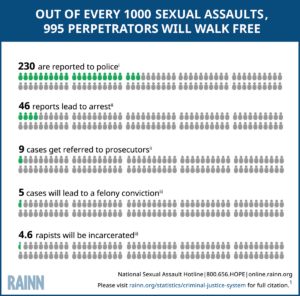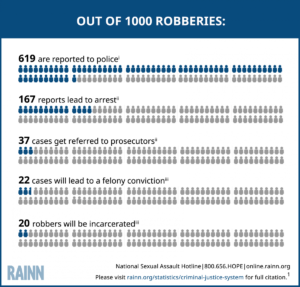Whenever a high-profile case comes out about sexual assault, harassment, or rape, someone throws around the possibility that the survivor is lying about their experience. This has been a very predictable pattern since the #metoo movement brought so many survivor stories into the national discourse. The “false reporting” argument is a red herring, an intentionally misleading line of questioning to distract from the issue of sexual violence justice.
The fact is sexual assaults are VASTLY underreported.

(rain.org/statistics/criminal-justice-system for full citation)
Compare this to robberies, a crime that does not carry stigma for the victim.

We know that sexual violence is a big problem for our community.
Every 92 seconds someone sexually assaults another person in the US.
The fact is that false reports of sexual violence are extremely rare, between 2 and 8%, and comparable to other types of crime. Imagine if each time we read about a robbery, we were reminded that 2-8% of robberies reported were false. Would we really know that person had a TV in the first place? Do they have their proof of purchase? What were they wearing at the time of the robbery? Did they leave their house unlocked? Why did it take them a week to report the crime? All these questions seem ridiculous in terms of a robbery but are asked of survivors of sexual assault routinely. These questions raise doubts about the credibility of the victim and lead people to doubt the reality of the crime.
When you talk about sexual violence, you may encounter this “false reporting” red herring argument. You have several options in how to respond.
- Pivot to the fact that sexual assault is vastly underreported.
- Say, “We are not here to be the detective, the attorney, or the judge. Sexual violence is a rampant problem in our community, and false reporting is not.”
It starts with us to change the discourse about sexual violence. How we discuss reports of sexual violence can challenge rape myths and make a culture that supports justice for survivors of sexual assault.
Written by Alex Ross-Reed (she, her, hers), a sexual violence prevention specialist, health educator, writer, and artist living in Albuquerque, New Mexico.

Recent Comments